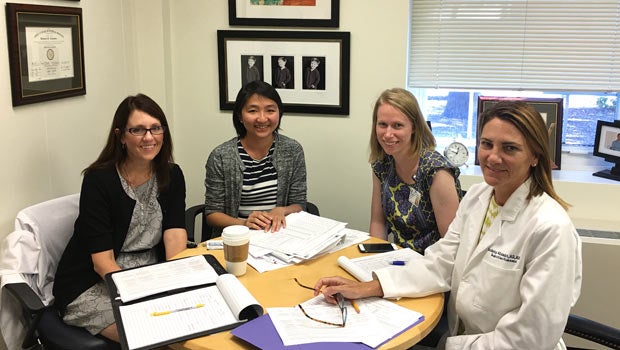
Dr Jasmine Chung (2nd from left) in a research meeting with Prof Barbara Alexander (4th from left), the head of transplant infectious diseases group in Duke University Hospital.
In July 2016, Dr Jasmine Chung, Associate Consultant at Singapore General Hospital's (SGH) department of Infectious Diseases, travelled to Durham, North Carolina. Her destination was Duke University Hospital, where she would spend her next one year.
Dr Chung is the first SingHealth clinician to be awarded a fellowship under the SingHealth Duke-NUS Academic Medicine Fellows Exchange Programme, an initiative under AM-ETHOS (Academic Medicine - Enhancing Training, Healthcare, Outcomes & Standards). Tomorrow's Medicine talks to Dr Jasmine Chung in Duke to find out more about her experience.
Can you share with us what you are working on in Duke?
I'm working with Dr Barbara Alexander who heads the transplant infectious diseases (ID) group at Duke University Hospital. Half of my time is spent attending to organ transplant recipients and patients with blood disorders who have infectious diseases issues.
I spend the other half of my time on my research interests – I'm currently working on a book chapter on anti-fungals and I'm also reviewing the impact of fluoroquinolone prophylaxis on high-risk haematology patients.
It's been six months since you started your fellowship. What's the most memorable part of your experience so far?
The authors of major ID textbook chapters are literally at my doorstep. It is one thing to read about these names, and another to know that they are only a few steps away from where I sit and that I get to have regular discussions with them. It is mind-blowing.
The faculty members, including the junior ones, are excellent educators, researchers and clinicians. This makes case conferences and journal clubs a vibrant experience. They often start with a simple presentation by a junior staff. Other clinicians then build up upon it by sharing their experience, discussion of controversies, or collectively come up with research ideas or solutions. Very often, the clinicians have their own clinical/research data to support their recommendations.
The physical, intellectual, institutional and overall academic environment met all my expectations. And the faculty have been very supportive and welcoming. All these sharpen my clinical and research skills, give me new perspectives and help me think outside the box.

What are the similarities you observe between Duke Health and SingHealth?
The clinical workload is high at both places. So the challenge to provide quality patient care, while still having time for clinical education and research is a perennial problem both institutions share.
(Residency) Programme Directors in both institutions juggle curriculum requirements and trainees' expectations. Where research is concerned, in Duke as in SingHealth, clinicians need to manoeuvre the landscape and its limitations in a professional, efficient way while not dampening research ideas, interests or enthusiasm.
In addition, there are information and technology (IT) demands on clinicians and researchers. For example, compulsory electronic clinical documentation and designing softwares that can cater to clinical, education and research needs. I would say that the pressure is higher at Duke than in Singapore, but as medical IT systems evolve more rapidly, Singapore would face the same challenges in the near future.
What's so different about the culture in Duke, that future exchange participants can learn from?
It's the prevalent culture of "Seek. Ask. Find." Sometimes in Singapore we are so concerned about getting the work done that we forget to think about the process. Here at Duke, asking questions, speaking up and speaking at the right time are practised all the time. I've learnt that by asking the critical question at the opportune time in the appropriate context, we gain for ourselves wisdom and understanding – the skills necessary for us to innovate.
Duke also has a culture of open communication and sharing. In Singapore we often only look to the most senior clinician for their knowledge. Here, even the younger residents and fellows can share their knowledge with clarity and confidence. Such an open communication regardless of seniority generates conversations, develops ideas and builds bridges.
If I get to go on the exchange programme in Duke, what should I make sure I do?
Observe, share and learn. There is always an opportunity in every clinical or research area. If you look for it, you will find it.
Most importantly, be part of the community and enjoy the serendipity as it unfolds.

Duke - SingHealth meeting with Duke-NUS Dean Prof Thomas Coffman (3rd from left),
and Duke's Vice-Dean for Education Dr Edward Buckley (3rd from right)
Who have given you support in making your experience happen?
There has been tremendous support by different people. In Singapore, Assoc Prof Tan Thuan Tong, Head of ID in SGH, has been very supportive. He had even placed the fellowship application form on my desk. The SingHealth Duke-NUS Joint Office of Academic Medicine, led by Prof Tan Kok Hian, facilitated this exchange.
I faced some administrative difficulty with the relocation at the start, but Group CEO Prof Ivy Ng, and Deputy Group CEOs Prof Fong Kok Yong and Prof Ang Chong Lye ensured that the exchange happens.
Over in Duke Health, Ms Patricia Joseph, Director of Duke-NUS Affairs has been very helpful with my visa application. I'm thankful to Dr Barbara Alexander and Prof John Perfect, Chief of the ID division in Duke. I am both humbled and thankful to be given this opportunity, to not only learn from my mentors but from my peers here at Duke. Iron sharpens iron.
The Academic Medicine Fellows Exchange Programme is a joint academic development initiative under AM-ETHOS for developing best practices, research ideas and mentoring methodologies through academic exchanges and collaborations between SingHealth Duke-NUS Academic Medicine Centre (AMC), Singapore and Duke Health, Durham, USA.
AM-ETHOS is developed by the Joint Office of Academic Medicine for building strategic capabilities to become a leading, global AMC. For more information about the programme, visit https://www.academic-medicine.edu.sg/am-ethos/AMFEP













 Get it on Google Play
Get it on Google Play